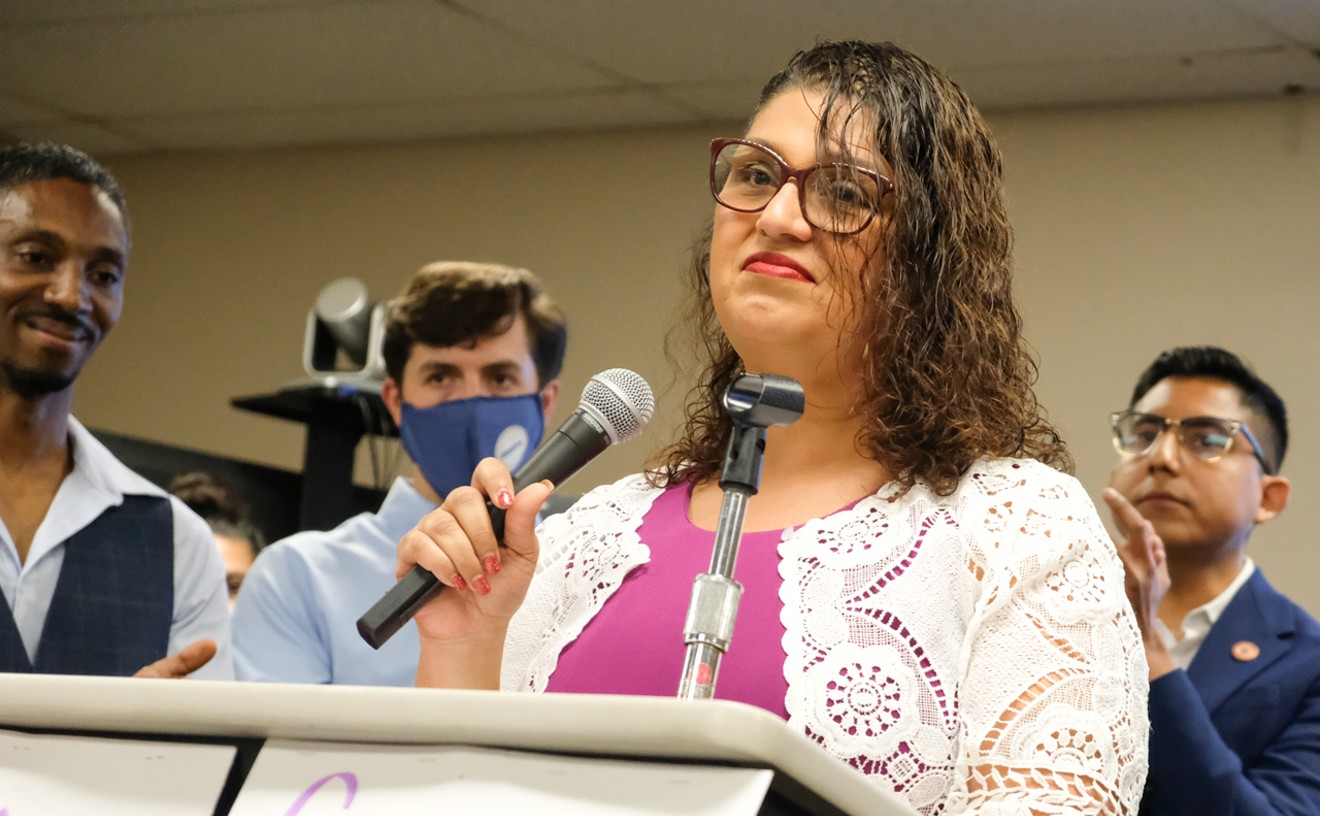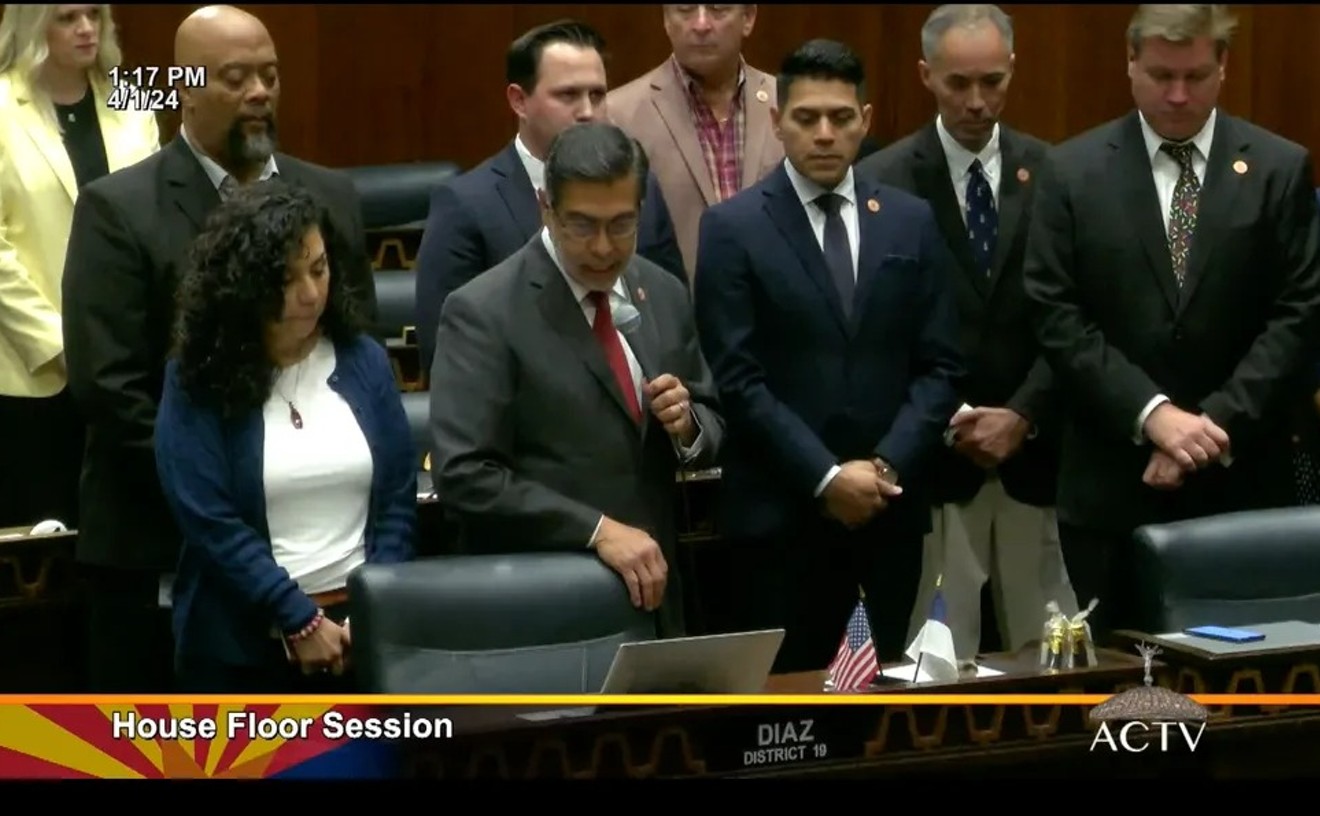Longtime parishioners of St. Jerome Catholic Church remember that 1993 morning well. It wasn't every day that the diocese sent them a new pastor, and, as is often the case, they knew little about him.
By appearance, Father Dennis Riccitelli seemed a typical priest. A little too stern-looking to call avuncular, he was 49 years old and balding, and he began the 11 a.m. Mass competently, guiding it through its programmatic crescendo.
Riccitelli then launched into his first homily--and spoke about his convertible.
Riccitelli sermonized about his pride in his automobiles and other possessions, including his condo. He bragged that he was independently wealthy, and had attained that wealth with a sharp business acumen as well as a windfall from a lawsuit. In his hands, he told his new flock, St. Jerome's would prosper.
He also asked the parishioners to wave when they saw him motoring down the street with the top of his car down.
His listeners say they didn't want to pass judgment on the father, but it was difficult to ignore that their new priest sounded more like an infomercial salesman than a spiritual leader.
It was the first sign that the match between Riccitelli and St. Jerome's might not be harmonious.
Within a year, that relationship became disastrous.
Riccitelli's critics say he was an absentee priest who, when he bothered to engage in church matters, intimidated members and employees to the point of abuse.
Those critics insist that they had experienced priests of vastly different temperament in the church's history. Some pastors at St. Jerome's had managed with a light touch, others had been more authoritarian. But never, parishioners say, had they encountered such a dictatorial priest.
Neither had they met one who seemed so averse to accountability. Riccitelli rejected existing systems of financial oversight, dismantling the parish council and replacing the finance committee with members who had little background in church-money matters.
Throughout 1994, attendance at St. Jerome's dwindled, and with it so did cash donations. Employee turnover soared.
Parishioners wrote hundreds of letters to Bishop Thomas J. O'Brien, leader of Arizona's diocese, imploring him to do something about Riccitelli.
With an extraordinary amount of desperation, frustration and sorrow, parishioners, with the help of church employees, went so far as to begin an investigation of Riccitelli and his use of St. Jerome's money.
They turned up records which suggested that Riccitelli was using parish funds for lavish furnishings and other personal uses.
The sleuths also discovered that before Riccitelli was assigned to St. Jerome's, he had spent an equally calamitous two years at a parish in Kingman, where attendance also declined, contributions plummeted, Riccitelli fired the volunteers who oversaw his use of money, and he was ultimately removed.
Kingman's problem had been dumped on St. Jerome's, it seemed.
Dissatisfied with the bishop's responses to their appeals, the parishioners at St. Jerome's took a more radical step. Just before Christmas 1994, at a time of year when churchgoers typically make their largest contributions of the year, Riccitelli's critics circulated a petition signed by 86 parishioners which called for a boycott of the collection plate.
Those who organized the boycott estimate that it cost the church more than $25,000.
Only then did Bishop O'Brien act.
O'Brien audited St. Jerome's books, proclaimed them clean, but then announced that Riccitelli had offered his resignation. O'Brien accepted it.
The yearlong upheaval nearly ripped St. Jerome's apart, members say. Only now are some families coming back to the parish, which continues to feel repercussions from the revolt.
Parishioners say they were led by Bishop O'Brien to believe that Riccitelli would never be put in a position of authority again, and that he would receive extensive counseling. They hoped it was true. Tumult at two parishes, they say, was enough evidence that Riccitelli needed help.
But Bishop O'Brien apparently had a change of heart.
Soon after he left St. Jerome's, Riccitelli became an associate pastor at Holy Cross Catholic Church in east Mesa.
It's one of the state's richest parishes. And unlike other parishes, it has no parish council and no finance committee. It's a church with little oversight of its lead pastor's use of those funds.
In the summer of 1996, Father Dennis Riccitelli became that pastor.
John Kornfeind recalls an anecdote that illustrates how things got to be such a mess at St. Jerome's.
He speaks of Orville.
Orville was a man in his 80s, a volunteer who couldn't move very quickly but who did his best to help out with the collection plates.
One morning, several other volunteers had failed to show up. Orville did all of the collecting on his own without complaining.
After the service, he was met in a side room with a furious Father Dennis Riccitelli.
Kornfeind happened to walk in while Riccitelli was verbally abusing the old man.
"Riccitelli is chewing this man up one side and down the other because he happened to be in there by himself. I guess Riccitelli was worried that someone would be skimming. . . . I felt bad for the old guy. Orville was trying to do the responsible thing. It was things like that that really turned me off."
Kornfeind resigned from the church's finance committee shortly thereafter. Riccitelli's predecessor had asked Kornfeind to sit on the committee and employ his skill with finances. Kornfeind, who works in the insurance industry, is a lifelong Catholic and had come to St. Jerome's in 1987.
"We had a priest by the name of Vernon Meyer who's now associated with the Kino Institute. Father Vernon asked several people to be on the finance committee since finances were not his forte. He asked for my perspective. He had other people, accountants and others with experience. There were problems left over from earlier pastors. We dealt with them."
Three years later, Meyer moved. Kornfeind says he and many others tried to welcome Riccitelli to St. Jerome's. "Right from the beginning, we found that he thought of himself as an autocrat. I'd run into other priests like that, but with Riccitelli, he chose to alienate all of the people who had formed St. Jerome's."
Riccitelli did not respond to New Times' repeated requests for interviews.
Kornfeind says longtime parishioners were offended when Riccitelli canceled early-morning weekday Masses and brought in outside priests for many of the Masses that did take place.
"St. Jerome's was not particularly rich. We have a school to run besides the church. But Riccitelli rarely said Mass himself. He brought in rent-a-priests. A lot of old-timers took offense to that. Here we're low on funds and you're paying for outside priests and not doing the work yourself."
Former liturgist Rory Cooney echoes that concern, writing via e-mail from a church in Illinois that Riccitelli seemed uninterested in saying many Masses.
"Dennis came in, and the first thing he told the staff and the parish was that the bishop hadn't sent him in to change anything at 'beautiful Saint Jerome's' which he said had a great reputation in the diocese. Then he turned around and within weeks of his arrival changed the Mass schedule to give himself more off time, because he said his number one concern was priest burn-out," Cooney writes. "There were a number of obnoxious homilies about his favorite dessert--tiramisu--and how hard it is to get reservations at expensive hotels in Las Vegas between Christmas and New Year's."
Riccitelli's indifference meant that greater responsibility fell to his associate pastor, Father Bob Bliven, parishioners say.
"Had it not been for Father Bob and his loving heart, I don't know how many people would have been left in our parish," says member Margie Scrip.
Bliven is currently associate pastor at St. Louis the King parish in Glendale. He declined to speak about his experiences at St. Jerome's.
"People started whittling away," Kornfeind says. "Some left the finance committee, and some left St. Jerome's altogether. I was the last of the original committee. He had brought in new faces, and I had no idea what their involvement with the church was. These people would be there for a few weeks, then disappear."
(Diocese guidelines instruct pastors to form finance committees out of parishioners with financial skills, and to appoint them for two- or three-year terms.)
Meanwhile, the church began going through bookkeepers. During Riccitelli's tenure, at least five would come and go.
Scrip and Kornfeind say that before Riccitelli's arrival, the church had been able to meet its financial obligations. But as the parish began to shrink, so did its ability to pay bills.
"People [donors] had been very consistent in the past, but now when Father Dennis would ask for more money, donations would actually go down. That's because they were suspicious of what was going on," Kornfeind says.
Scrip explains how members were motivated to conduct their own investigation: "When people make contributions to the parish, they assume that their money will be used to run the school, to repair the parish roof, to pay the salaries of staff members, to keep the parish books balanced. Then why was there no money to pay the bills?"
However, every St. Jerome's member who agreed to talk to New Times stressed that while concerns about Riccitelli's use of parish money were important, it was Riccitelli's effect on the spiritual life of the community that primarily fueled the rebellion that would follow.
A present employee of the church, who asked to remain anonymous, explains that parishioners were turned off to Riccitelli's "sense of spirit."
"He didn't speak a God language, and I think people got a sense of that. Charity, forgiveness, how to be a Christian. He had trouble with that language.
"I think in normal circumstances, Catholics are content to be Catholics. . . . But this was a parish that had very high standards. These were very intelligent people who cared about their church," the employee says.
Kornfeind says, "St. Jerome's had been a loving, caring community, and suddenly it wasn't. How do you deal with that? Suddenly, the world isn't right anymore. So what do you do about it?
"Going to the bishop seemed to make sense."
"I'm a cradle Catholic, and all of my life I've put priests up on a pedestal. It was one of the hardest things I've ever done," says one St. Jerome's parishioner of his decision to help investigate Riccitelli. The parishioner, like many others, wrote to Bishop Thomas J. O'Brien, imploring the bishop to take some action.
New Times obtained several of the letters, including one written by an employee at the church:
Dear Bishop O'Brien,
I find myself greatly distressed about events that have occurred at St. Jerome's parish and feel compelled to write to you and inform you of these circumstances. . . . There is a problem with Father Dennis Riccitelli, the pastor. This man appears to have no compassion whatever for the people he is supposed to be ministering to. . . . St. Jerome's used to be alive and vital. Now it is only a shell of what it once was. People just keep going to other parishes and a few even to other denominations. . . . I have seen so much and just don't know what to do and I have anguished over this letter for several months, but I finally let my conscience dictate to me and decided it had to be written. I hope others have written. . . . I would also like to suggest you do an audit of St. Jerome's for the past year. It should prove interesting to you and others.
The employee detailed instances of Riccitelli's indifference to his flock, his unwillingness to minister to parishioners whose donations were low, and his wholesale replacement of volunteers and employees who handled the church's money. Other letters echo these concerns.
A 16-year-old parishioner wrote to the Bishop, complaining that because of Riccitelli's indifference to his flock during communion, "It seems like he is handing out potato chips instead of the body of Christ."
Kornfeind says that he, too, wrote letters to the bishop. And was rewarded with the bishop's wrath.
"In placing this man at control of this parish you could have done no worse than to have placed the devil himself here," Kornfeind wrote.
"Father Dennis may have his shortcomings," Bishop O'Brien shot back, "however, it is extremely harsh judgment for you to equate him with the devil himself. I find this offensive."
Other parishioners say they got no response at all from the bishop. Eventually, however, as 1994 progressed and the problem became too obvious for the diocese to ignore, Bishop O'Brien assigned a special liaison to St. Jerome's to hear complaints, parishioners say.
"With the Catholic Church, let's not delude ourselves, it's a political body. But it's not a democracy. They don't care if it's 1,000 or 100,000 people writing," Kornfeind says.
Pleas to the bishop seemed to be getting parishioners nowhere. So, with the help of some church employees, members began investigating their priest.
On December 16, 1994, 86 parishioners signed a letter which reported the results of that investigation and called for a general boycott of the Christmas donation, traditionally the largest of the year.
"Look at the sample enclosed expenditures," the letter states. "Did any of us expect that in excess of $15,800 would be used to refurnish our pastor's . . . residence, while much needed repairs to our facilities have gone unattended? In addition . . . we have evidence of over $8,800 that was used to pay personal credit cards."
Attached to the letter was a list of expenditures that parishioners claimed were used to refurbish Riccitelli's rectory--the priest's home owned by the parish. Scrip says the rectory was in good shape when Riccitelli moved in.
Among the expenditures, meanwhile, were questionable hotel-room bills and credit-card reimbursements that seemed to have had little to do with the running of St. Jerome's. Parish checks obtained by New Times which span a 15-month period also include several drafts totaling $2,595 which Riccitelli had written to himself or for cash.
Acknowledging that a priest's salary is low, Scrip points out that many of his needs are met by a parish. Provided housing and other amenities, priests are not expected to need a large income. Unlike some orders, however, priests in the Phoenix diocese do not take vows of poverty. But that doesn't entitle them to enrich themselves with church donations, Scrip says.
Parishioners could not have timed their rebellion with more impact. Scrip and others say that $25,000 is a conservative estimate of the money their boycott cost the parish.
On Christmas Eve, Riccitelli responded with a letter of his own:
Please know that not only am I completely innocent of these charges, but the mysteriously obtained facts and figures are completely erroneous. As Pastor I have been diligent in the distribution of financial pastoral reports. These reports can withstand any kind of audit if necessary. I am certainly open to any objective inquiry from the Diocese or any other source. The $15,000 that was mentioned in last week's letter was spent on a multitude of items for the church office, the associate's rectory as well as for my rectory. Any items purchased for either rectory are the property of St. Jerome's Church and not the property of the priests. The $8,000 accusation is ludicrous. Men do not become priests for financial or material gains. My gross salary before taxes is $16,406. . . . Any church-related credit card expenses that I incurred were naturally reimbursed by the parish. Any credit card expenses that were of a personal nature were paid by me personally. All these figures are well documented.
Two days later, Riccitelli sent out another letter, this time telling staff that because of "serious financial restrictions," they faced salary cuts of 10 percent to 40 percent.
"In addition to the salary reductions, you may be asked to reduce your work load to 1U2 or 3U4 of your present activities. And your salary will decrease accordingly."
But Scrip says the cuts were never made. She believes Riccitelli sent the letter to intimidate staff, who had obviously helped the parishioners with their revolt.
On January 3, Bishop O'Brien announced that he and Riccitelli had "agreed that an objective review and audit of parish matters should be conducted by a special committee appointed by me so that clarification can be achieved."
An official audit began.
When it was done, however, the diocesan committee took with it the records that it had examined, Scrip claims, making them inaccessible to parishioners.
On February 8, Bishop O'Brien reported the results of the investigation, writing, "The audit, which should dispel any further rumors or speculation, showed that there was no misappropriation of parish funds by Father Riccitelli for his personal gain. . . . Father Riccitelli's style of pastoral ministry also came under criticism and was addressed in the report. . . . Out of concern for the parish, Father Riccitelli subsequently offered me his resignation as Pastor--which I accepted."
Parishioners claim that the bishop assured them Riccitelli would get extensive counseling.
They say they certainly never expected that he'd work as a pastor again in the Diocese of Phoenix.
"He did go for counseling, as a matter of fact. Then he came back," says Father Blase Meyer, pastor of St. Maria Goretti Catholic Church in Scottsdale.
Eight months after he resigned from St. Jerome's, Riccitelli became associate pastor at Holy Cross Catholic Church in Mesa. At the time, Meyer was its lead pastor. The two of them are good friends and have owned a condominium in Ahwatukee since 1986 as a place to go on their days off, Meyer says.
Meyer was the only church official who would speak about Riccitelli's travails. Bishop O'Brien didn't return calls. His spokeswoman, Marge Injasoulian, says the diocese considers Riccitelli's experiences a personnel matter and will not discuss them, particularly with New Times, which she claimed harbored an anti-Catholic bias.
Meyer, meanwhile, says that complaints about Riccitelli are based on the fabrications of a few unhappy parishioners.
"The problems that occurred were malcontent people looking for a scapegoat. I think Father is very conscientious about his job. Some people like to do their own thing. They like to make up stories. I think a few have vendettas. And you have to be careful who you listen to and what ax they have to grind. I think they're badmouthing a really good person, a very dedicated priest."
Meyer, 56, says he met Riccitelli, now 54, in Pennsylvania, where Meyer was a chaplain at Penn State.
Riccitelli entered the priesthood in middle age, he told parishioners, after receiving a $40,000 settlement stemming from an auto accident, and paying off his debts.
"He comes from a business background. He was in social work in charge of an office," Meyer says. Riccitelli was ordained in the Phoenix diocese and began his work as an associate pastor at St. Timothy Catholic Church in Mesa in the late 1980s.
In January 1989, Riccitelli became pastor of St. Mary Catholic Church in Kingman--and immediately alienated the people who would oversee his spending.
In a letter to the bishop, finance committeeman Tom Spear wrote that when Riccitelli met with the committee for the first time, he announced that he planned to spend up to $9,000 on improvements for his rectory, and that he'd discontinued payments to the diocese to retire the church's debt. He'd discussed none of it with finance-committee members before that night.
Spear tells New Times that Riccitelli later upped the amount he wanted for a rectory remodel to $20,000. Finance-committee members balked, Spear says, and asked to examine the house themselves to see what could need so much work. Riccitelli refused.
Riccitelli would dissolve the committee later that year. It was an unpopular decision that produced an embarrassing showdown for the priest. He called for an October 1989 meeting to discuss upgrading some of the parish's old buildings. In a letter to Bishop O'Brien, Spear described the meeting: When it started, Spear writes, it was obvious that the 40 attendees wanted to discuss the finance committee and other recent problems between the priest and his flock.
So Riccitelli put it to a vote. Which did the people prefer to discuss? Old buildings or new problems? When the crowd showed that it wanted to discuss the latter, Riccitelli bolted.
By the middle of 1990, unhappy parishioners at St. Mary's had resorted to announcing their meetings in the local paper. "Enough! Tired of hearing about all the complaints, your friends leaving, authorities of the diocese ignoring your letters and calls? Join us! Concerned Parishioners of St. Mary's Church," read an advertisement.
As was the case at St. Jerome's, dissatisfaction with Riccitelli spread far beyond finances. In dozens of complaints sent to the diocese, St. Mary's parishioners write of their distress over Riccitelli's ministering and openly plead for a new pastor. They complain of Riccitelli's disdain for accountability; his tendency to explode in anger, even during Mass; his absenteeism and lack of interest in church programs; his indifference to grieving families, refusing in one case to walk even a block to comfort the relatives of a young church member killed in a work accident; his callous treatment of young couples seeking pre-marriage and adoption counseling; his inability to remember the names of parishioners.
One parishioner who had a background both as a priest and a Benedictine monk wrote that Riccitelli was "without a doubt the most self-centered, vain, materialistic, mean-natured priest I've ever had the misfortune to come across. . . . Father has confused ordination with coronation."
Bishop O'Brien told parishioners that Riccitelli would not be moved. And he wasn't, at least until July 1993, when Riccitelli was reassigned to St. Jerome Catholic Church.
Spear still doesn't understand that decision by Bishop O'Brien. "This man should not be a priest. But the pope of Phoenix doesn't see it that way. I can say those kinds of things now. I'm a recovering Catholic. Dennis is a problem. I don't know why the bishop does this. They do this with other problems, they just move them around."
In 1989 and 1994, New Times reported the cases of several Valley priests who had molested boys. In each case, the diocese had ignored early warnings that the priests might be pedophiles, and worked hard to keep news of the molestations from the public.
In one case, Bishop O'Brien, aware that a priest had become involved with a young boy four years earlier, allowed that priest to teach at a Catholic high school. When the priest was arrested for sexually molesting a student, O'Brien did not fire him.
Such incidents, parishioners say, explain to them why O'Brien preferred to deal with accusations about Father Riccitelli by simply moving him.
He was now St. Jerome's problem.
Margie Scrip tries to explain how frustrating it was for St. Jerome's parishioners to learn about problems Riccitelli had encountered in Kingman. "The more we learned this was an old story, the more difficult it became to accept the diocese doing nothing. Everything was the same except the names of the churches," she says.
But she and other parishioners say they never expected Riccitelli to move on to yet another church.
"To see him the pastor in another church is a shock and a great disappointment to us," says a present St. Jerome's employee.
They wonder about the wisdom of putting Riccitelli in charge of Holy Cross Catholic Church in east Mesa. Located on Power Road and bordering the parking lot of Superstition Springs Center, it serves the population of nearby Leisure World and other retirement communities.
In the winter, attendance at the church--and money in its collection plates--overflows.
Yet Holy Cross has neither a pastoral council nor a finance committee.
Riccitelli has none of the oversight he fought so fiercely against in his previous parishes.
Father William Mitchell, who founded Holy Cross and continues to say Mass there occasionally, says he was in the process of forming a pastoral council and finance committee when he retired in 1995. He says he knew little about Riccitelli when the priest arrived to join pastor Blase Meyer. "I had heard that there were some problems, but that was before he arrived," Mitchell says.
As for Riccitelli's stint as pastor of Holy Cross, Mitchell says he knows of no problems. Asked about a recent large turnover of employees, Mitchell answers: "If you heard about a lot of employees leaving, then I must have heard the same thing."
A longtime parishioner and volunteer who asked not to be named says that many of the employees at Holy Cross have had problems with Riccitelli. Several have been driven off, he says, by Riccitelli's "domineering approach."
"The big turnover shocked a lot of people. But I've been staying away from it. I just told him right off, I don't take any crap from him.
"He has problems. He is aware of his problems and he's trying to do something about it . . . but I'd prefer we didn't have to go through all this. We've had a lot of problems.
"There's no check of accountability now, as far as I can tell. He's stressing financial security, but we don't know what happens after money leaves the collection plate. In winter, we can take in $22,000 to $25,000 [per weekend]. It sure would be a hell of a temptation if there was a problem before."
Other parishioners speak up for Riccitelli, saying that he's a perfectly good priest, and that they were unaware of any problems in his past.
Parishioner Marceline Franey, who attends Mass every day, says Riccitelli's overbearing manner has had an effect. "I have noticed that a lot of people have left Holy Cross. I'm sure that's what it is."
Franey says she can see that Riccitelli affects other parishioners, but she doesn't let him bother her. She considers it a test of faith.
"I figure we don't really have a pastor. He's never there. Right now he's taking Italian," she says, adding that Riccitelli's recent trip to Vermont to study Italian and his annual pilgrimages to Italy have raised eyebrows in the church.
"The only reason he came back this weekend was to get his check," she says, laughing. "That's what we were joking about this morning."
Other members tell familiar stories of absenteeism, indifference and focus on materialism.
Some parishioners say they were shocked when Meyer allocated church funds to purchase a rectory in 1995 which Riccitelli now lives in.
"We saw the bill and we couldn't believe it. They bought themselves a rectory that was a huge home for about $200,000 when there were perfectly good houses for $80,000 a lot closer to the church. And the other stuff, too, Berber carpeting, a Jacuzzi, the 35-inch television. Riccitelli's got it good," says a parishioner whose wife works at the parish. "The man's psychologically bent. I wish I had a nickel for every time my wife came home in tears."
Parishioners say that some members have begun circulating petitions about Father Riccitelli, and that others are beginning to make appeals to Bishop O'Brien.
As a familiar pattern at Holy Cross Church begins to emerge, parishioners at St. Jerome's and St. Mary's wonder about diocese leadership.
"I think it's important for you to understand. There's a shortage of priests," says Margie Scrip. "The most charitable explanation for O'Brien and his leniency in the matter would be that he doesn't have a lot of priests to assign to parishes. But I feel that no priest is better than a bad priest."
Other parishioners endorse the idea of nonpriests running parishes as long as the church continues to suffer from a shortage of men willing to make the sacrifices expected of priests.
John Kornfeind, however, disagrees that O'Brien's decision to move Riccitelli to Holy Cross was something that could be explained by a lack of alternatives.
"Anybody who says this is naive, in my mind. This bishop has a reputation for recycling bad habits. I fully expected Dennis would show up again, and sure enough, he did.










